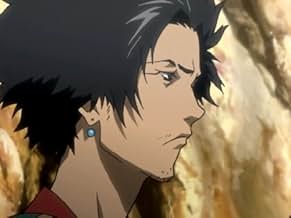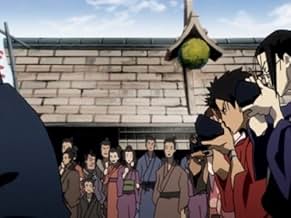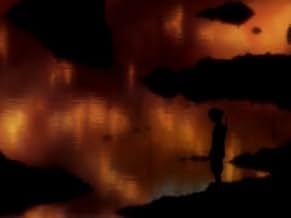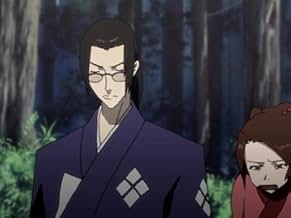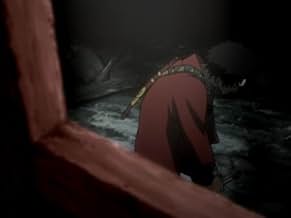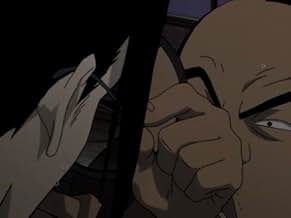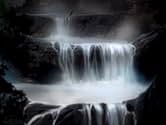फू, एक वेट्रेस जो एक टीहाउस में काम करती है, दो मास्टर तलवारबाजों, मुगेन और जिन को उनके निष्पादन से बचाती है, ताकि उन्हें सूरजमुखी की गंध वाले समुराई को खोजने में मदद मिल सके.फू, एक वेट्रेस जो एक टीहाउस में काम करती है, दो मास्टर तलवारबाजों, मुगेन और जिन को उनके निष्पादन से बचाती है, ताकि उन्हें सूरजमुखी की गंध वाले समुराई को खोजने में मदद मिल सके.फू, एक वेट्रेस जो एक टीहाउस में काम करती है, दो मास्टर तलवारबाजों, मुगेन और जिन को उनके निष्पादन से बचाती है, ताकि उन्हें सूरजमुखी की गंध वाले समुराई को खोजने में मदद मिल सके.
एपिसोड ब्राउज़ करें
सारांश
Reviewers say 'Samurai Champloo' is acclaimed for merging Edo-period Japan with modern hip-hop, featuring a standout soundtrack by artists like Nujabes. Characters Mugen, Jin, and Fuu offer distinct personalities and fighting styles, enhancing the show's eclectic tone. The animation is lauded for dynamic fight scenes and vibrant art. Despite episodic structure and lack of a central plot, the series is praised for engaging character dynamics, humor, and its unique blend of historical and modern elements.
फ़ीचर्ड समीक्षाएं
Let me begin by saying I am a huge Cowboy Bebop fan. Spike Spiegel is my hero, okay? So as much as I was dying to see this new work from the mind of Shinichiro Watanabe, I was apprehensive from the standpoint that I didn't want to see any subsequent work destroy any luster or afterglow that Bebop left behind in its wake. I was downright scared, I mean, how can you mix samurai action with hip-hop? I know Bebop's atmosphere of 1940's noir and 2071 spaceships didn't seem possible at first, but I was proved wrong by that. Maybe Watanabe-san had stepped too far outside the box this time.
I'll just come right out and say it: Shinichiro Watanabe can make anything he dreams up work. ANYTHING.
Samurai Champloo is one of the absolute coolest series I have ever seen. And by ever I mean live-action, animated, whatever. "Ever" ever. If you like anime, this is required watching, a new classic for the medium. If you don't like anime, watch this and you just might start to.
The story centers around two rogue samurai and the girl they're somewhat assigned to protect. Fuu, the young damsel who always seems to get in and out of distress; Jin, the serious samurai, and Mugen, the samurai who's seriously un-serious. The three travel around Edo-period Japan in search of the mysterious "Sunflower Samurai". And if I told you any more than that, I'd ruin so much of it for you. Just know this - the first episode will hook you like Tyrone Biggums to crack.
If you're a fan of anime or Cowboy Bebop or just really bad-ass shows/movies in general, you owe it to yourself to check this one out. You can pick up the DVDs or just check it out Saturday nights on Adult Swim.
Oh, and if you watch Adult Swim regularly and haven't caught Samurai Champloo yet, shame on you. You should know better.
I'll just come right out and say it: Shinichiro Watanabe can make anything he dreams up work. ANYTHING.
Samurai Champloo is one of the absolute coolest series I have ever seen. And by ever I mean live-action, animated, whatever. "Ever" ever. If you like anime, this is required watching, a new classic for the medium. If you don't like anime, watch this and you just might start to.
The story centers around two rogue samurai and the girl they're somewhat assigned to protect. Fuu, the young damsel who always seems to get in and out of distress; Jin, the serious samurai, and Mugen, the samurai who's seriously un-serious. The three travel around Edo-period Japan in search of the mysterious "Sunflower Samurai". And if I told you any more than that, I'd ruin so much of it for you. Just know this - the first episode will hook you like Tyrone Biggums to crack.
If you're a fan of anime or Cowboy Bebop or just really bad-ass shows/movies in general, you owe it to yourself to check this one out. You can pick up the DVDs or just check it out Saturday nights on Adult Swim.
Oh, and if you watch Adult Swim regularly and haven't caught Samurai Champloo yet, shame on you. You should know better.
Mugen is a fairly dim, self-taught swordsman who doesn't know how to hold back, Jin is the perfect samurai: cold, calculating, every move flawless. They could be no more different, and in fact one would gladly kill the other with the chance, but they are both reluctantly recruited by the ditsy teahouse waitress Fuu after she saves them from execution.
Samurai champloo is the story of Mugen, Jin and Fuu, as they journey across Japan trying to find "The samurai who smells of sunflowers." All the way they meet all sorts of people, get into trouble, and try to make money. As the show progresses, the mysteries of the characters pasts are slowly revealed.
Samurai champloo is an excellent series from the people who made Cowboy Bebop, the animated sequence in Kill Bill, and a few sequences in the Animatrix. The music is good, offering a wide variety of genres, the animation is excellent, and the dialog is kept to a bare minimum. Oh, and the comedy is great, too.
If you liked Cowboy Bebop, you will probably like Samurai Champloo. One's set in the future and has a lot of jazz music, the other's set long ago in Japan and has a lot of rap in the scene transitions. But the character types in both are pretty much the same, and in both the characters must come to terms with themselves. I recommend it to fans of this genre of anime.
Samurai champloo is the story of Mugen, Jin and Fuu, as they journey across Japan trying to find "The samurai who smells of sunflowers." All the way they meet all sorts of people, get into trouble, and try to make money. As the show progresses, the mysteries of the characters pasts are slowly revealed.
Samurai champloo is an excellent series from the people who made Cowboy Bebop, the animated sequence in Kill Bill, and a few sequences in the Animatrix. The music is good, offering a wide variety of genres, the animation is excellent, and the dialog is kept to a bare minimum. Oh, and the comedy is great, too.
If you liked Cowboy Bebop, you will probably like Samurai Champloo. One's set in the future and has a lot of jazz music, the other's set long ago in Japan and has a lot of rap in the scene transitions. But the character types in both are pretty much the same, and in both the characters must come to terms with themselves. I recommend it to fans of this genre of anime.
Samurai Champloo is the long-awaited next project from Cowboy Bebop director Shinichiro Watanabe. His two short films in the Animatrix compilation (Kid's Story and Detective Story) give American audiences a sneak peek at the phenomenal art style of this series, but they barely hint at the jaw-dropping action and unorthodox blend of history and music contained therein.
The similarities with Bebop end at the fact that the series has three protagonists: the vagrant swordsman Mugen, the rogue samurai Jin, and the tea-shop waitress Fuu. This unlikely and volatile trio begin a road journey through post-shogunate Japan (ca. 1780), brought together by circumstances best seen to be believed.
"Champloo" means mixed-up or stir-fry, and that's what this series is: a stylish blend of old school values and situations, meshed with more modern sensibilities, fighting styles, and visual design. Over the lush, dynamic art, a soundtrack of some of the best hip-hop from modern Japan plays. Though it's a noticeable device in the first few episodes, it doesn't take long before the music feels like second nature despite the anachronism.
Champloo is many things: a mature drama, an action series, an uproariously funny comedy and a visual feast. Watanabe-san demonstrates here that the success of Cowboy Bebop was uniquely his, and no fluke - fans of that series will not be disappointed, despite how radically different the two story lines are from one another.
As the title card of the first episode of Samurai Champloo says, "Just shut up and watch."
The similarities with Bebop end at the fact that the series has three protagonists: the vagrant swordsman Mugen, the rogue samurai Jin, and the tea-shop waitress Fuu. This unlikely and volatile trio begin a road journey through post-shogunate Japan (ca. 1780), brought together by circumstances best seen to be believed.
"Champloo" means mixed-up or stir-fry, and that's what this series is: a stylish blend of old school values and situations, meshed with more modern sensibilities, fighting styles, and visual design. Over the lush, dynamic art, a soundtrack of some of the best hip-hop from modern Japan plays. Though it's a noticeable device in the first few episodes, it doesn't take long before the music feels like second nature despite the anachronism.
Champloo is many things: a mature drama, an action series, an uproariously funny comedy and a visual feast. Watanabe-san demonstrates here that the success of Cowboy Bebop was uniquely his, and no fluke - fans of that series will not be disappointed, despite how radically different the two story lines are from one another.
As the title card of the first episode of Samurai Champloo says, "Just shut up and watch."
The anime has the setting of the Edo time period of Japan and it is surprising how perfectly the Hip hop music matches with this kind of a setting. Not only the opening song, Battlecry gives you the elegant vibes, the other songs like Small Circle of Friends and San Francisco are just as catchy. Even the non-hip hop songs like Shiki no Uta, Who's theme and Obokuri-Eeumi in the Okinawan dialect give you the feelings of the 90s nostalgia. The OSTs which are played during the fight scenes or the deep conversations are really well made and perfectly suit to those respective scenes. Nujabes has been widely praised for the Samurai Champloo soundtrack and very rightly so. In terms of quality, this soundtrack is second to none(Okay, maybe second only to Naruto's). This anime has made me appreciate the Japanese Hip hop even though I have never found the conventional Western Hip hop interesting.
Having the setting of Edo Japan, the anime has several historical references. While there is some accuracy in it, most of it is just for fun. The story revolves around Mugen, Jin and Fuu as they journey across Japan trying to find "The samurai who smells of sunflowers." In their journey, they experience all sorts of crazy things, get into trouble and try to make money or find the means to survive as long as they are traveling together. As the show progresses, the mysteries of the characters' pasts are slowly revealed. The anime has a bittersweet ending. Once their motives are all achieved, the three characters go on their separate paths. Yet, it doesn't really intend to make us feel emotional. In an elegant manner and using the Hip hop style, they just ask us to carry on whilst playing the song 'San Francisco.'
The characters are so damn interesting. I was shocked to see the character of Mugen. It was nothing like any other main character. As a self-taught and ruthless swordsman, he just doesn't know how to hold back. Not only is he arrogant but always looks to pick up meaningless fights and wouldn't mind brutally injuring or killing others. His past is beautifully explored though. You would understand from where he got such beasty personality. Jin has noted that it is surprising how a reckless and impulsive man like him is still alive. Despite traveling together and having minimum hatred for each other, Mugen and Jin wish to kill each other someday. Despite Jin being just as cold on a contrary, he is much wiser and calculating samurai. Rarely losing his stoic exterior, he doesn't bother sharing his past, his motives, his mysteries or even his basic feelings with Mugen and Fuu. He does however manage to fall in love with a woman, who taught him how to cook Eel. Fuu, despite being cheerful and a foody woman, too has her own motives. In fact, the main storyline of this show entirely depends on what she is upto or on the factors responsible for her actions or decisions. Fuu seems to be much more sensible than Mugen and Jin, something that allows her to trick even such cold men and make them work for her.
Few episodes are only for the references sake. So don't be shocked when you see the main characters apparently dying just for them to appear well and alive in the very next episode as if nothing was happened to them. I am pretty sure most of the people won't take it positively. Nevertheless, the things that matter the most are fabulously done. For instance, the scene in which we see Mugen drowning and we get to see the glimpses of his past life. Not only was the scene emotional, nicely animated and perfectly executed, but the song Obokuri-Eeumi makes it look even more beautiful and deep. The action scenes are brilliantly choreographed as well. Some of those managing to trigger the characters' philosophies or deep thoughts really make the show look more interesting.
The elegance of Samurai Champloo has managed to amaze me and even the ending was done in such a way that the completion of the anime feels totally satisfying. I will praise it endlessly but on the other hand, I will also have no complaints if it doesn't have the season 2.
Having the setting of Edo Japan, the anime has several historical references. While there is some accuracy in it, most of it is just for fun. The story revolves around Mugen, Jin and Fuu as they journey across Japan trying to find "The samurai who smells of sunflowers." In their journey, they experience all sorts of crazy things, get into trouble and try to make money or find the means to survive as long as they are traveling together. As the show progresses, the mysteries of the characters' pasts are slowly revealed. The anime has a bittersweet ending. Once their motives are all achieved, the three characters go on their separate paths. Yet, it doesn't really intend to make us feel emotional. In an elegant manner and using the Hip hop style, they just ask us to carry on whilst playing the song 'San Francisco.'
The characters are so damn interesting. I was shocked to see the character of Mugen. It was nothing like any other main character. As a self-taught and ruthless swordsman, he just doesn't know how to hold back. Not only is he arrogant but always looks to pick up meaningless fights and wouldn't mind brutally injuring or killing others. His past is beautifully explored though. You would understand from where he got such beasty personality. Jin has noted that it is surprising how a reckless and impulsive man like him is still alive. Despite traveling together and having minimum hatred for each other, Mugen and Jin wish to kill each other someday. Despite Jin being just as cold on a contrary, he is much wiser and calculating samurai. Rarely losing his stoic exterior, he doesn't bother sharing his past, his motives, his mysteries or even his basic feelings with Mugen and Fuu. He does however manage to fall in love with a woman, who taught him how to cook Eel. Fuu, despite being cheerful and a foody woman, too has her own motives. In fact, the main storyline of this show entirely depends on what she is upto or on the factors responsible for her actions or decisions. Fuu seems to be much more sensible than Mugen and Jin, something that allows her to trick even such cold men and make them work for her.
Few episodes are only for the references sake. So don't be shocked when you see the main characters apparently dying just for them to appear well and alive in the very next episode as if nothing was happened to them. I am pretty sure most of the people won't take it positively. Nevertheless, the things that matter the most are fabulously done. For instance, the scene in which we see Mugen drowning and we get to see the glimpses of his past life. Not only was the scene emotional, nicely animated and perfectly executed, but the song Obokuri-Eeumi makes it look even more beautiful and deep. The action scenes are brilliantly choreographed as well. Some of those managing to trigger the characters' philosophies or deep thoughts really make the show look more interesting.
The elegance of Samurai Champloo has managed to amaze me and even the ending was done in such a way that the completion of the anime feels totally satisfying. I will praise it endlessly but on the other hand, I will also have no complaints if it doesn't have the season 2.
With 1998's "Cowboy Bebop", one of the most acclaimed anime TV series ever (go read the comments index for it here on IMDb if you don't believe me!), Shinichiro Watanabe became a creative force to watch out for. The innovative energy, drama and beauty of "Bebop" are carried forward in his second original series, "Samurai Champloo". Fans have been quick to look for similarities between "Bebop" and "Champloo" (even the titles have clear parallels), and it's true there are some: the assembly-of-rootless-loners cast of characters, the dramatic and cinematic visual style, and especially the importance and integration of music into the storytelling mix--in SC's case, everything from hip-hop beatboxing to Ainu and Okinawan folksong. But "Champloo"'s differences from "Bebop" are much more interesting than its likenesses. "Bebop" is drenched in melancholy and regret, dreams of the lost past and the future that couldn't be. "Champloo" is all about facing the future, the wave of change, the onrush of history that can't be stopped, and how three kids from widely diverse backgrounds--not even friends when they set out-- find themselves right on the crest of that wave. We're in Edo Period Japan; since 1638 the Tokugawa Shogunate has banned contact with all countries except China and Japan, a ban that lasted two centuries. The outside world can't be kept outside forever. Even the long-respected samurai class is losing its power, and there's restlessness in the land plus accompanying pressure from the Shogunate on all sides. Through this uneasy landscape (rendered in lushly beautiful watercolors that might remind you of Miyazaki) wander our cast of characters: outlaw ronin Jin, a gifted swordsman, stoic, disciplined and heartbreakingly gorgeous, devoted to the bushido code but exiled for killing his sensei; Okinawan wild-boy Mugen, orphan, former pirate and brilliant innovator, whose fighting style mixes everything from Brazilian capoeira to break-dancing, and whose feral-child innocence faces the toughest tests in the series; and teahouse waitress Fuu, spunky, compassionate and packing a lot of secrets, who rescues the two swordsmen from the executioner's block and enlists them on her quest to avenge her mother's death. On their long walk from Edo to Nagasaki they'll see a lot, face a lot of trials, starve, quarrel, save each other's lives, break up, re-bond, and become inseparable. Except that Jin and Mugen still swear they'll fight to the death one day, and no one (not even Fuu) is saying anything about the Sunflower Samurai, the object of Fuu's quest.
Have I made this sound like a straight historical drama? I ought to mention that it can be hysterically funny as well as vividly bloody, contains knockout fight scenes and anachronisms by the carload (the aforementioned break dancing and beatboxing, Jin's Armani glasses, the appearance of landmarks not built till the 1900s...), has made me cry more times than any anime since "Bebop", and has sharp things to say about the heavy hand of authority and tradition on groups as diverse as gay men, married women, foreigners, aboriginal natives and illegal aliens. It's unfailingly beautiful to look at (well, 95% unfailingly) and listen to, delectably well-written, and simply brilliant. When it gets to America, go find it.
Have I made this sound like a straight historical drama? I ought to mention that it can be hysterically funny as well as vividly bloody, contains knockout fight scenes and anachronisms by the carload (the aforementioned break dancing and beatboxing, Jin's Armani glasses, the appearance of landmarks not built till the 1900s...), has made me cry more times than any anime since "Bebop", and has sharp things to say about the heavy hand of authority and tradition on groups as diverse as gay men, married women, foreigners, aboriginal natives and illegal aliens. It's unfailingly beautiful to look at (well, 95% unfailingly) and listen to, delectably well-written, and simply brilliant. When it gets to America, go find it.
IMDb's Top 50 Anime Series
IMDb's Top 50 Anime Series
See which anime series our fans recommend the most. Titles with more than 10,000 votes are featured in our ultimate anime watchlist.
क्या आपको पता है
- ट्रिवियाThe series was only allowed to be aired past 12:00 am in Japan for the network deemed it too graphic for prime time television.
- इसके अलावा अन्य वर्जनThe episodes aired on Adult Swim are edited for language and other content.
- कनेक्शनFeatured in Troldspejlet: एपिसोड #33.3 (2005)
टॉप पसंद
रेटिंग देने के लिए साइन-इन करें और वैयक्तिकृत सुझावों के लिए वॉचलिस्ट करें
- How many seasons does Samurai Champloo have?Alexa द्वारा संचालित
विवरण
इस पेज में योगदान दें
किसी बदलाव का सुझाव दें या अनुपलब्ध कॉन्टेंट जोड़ें






